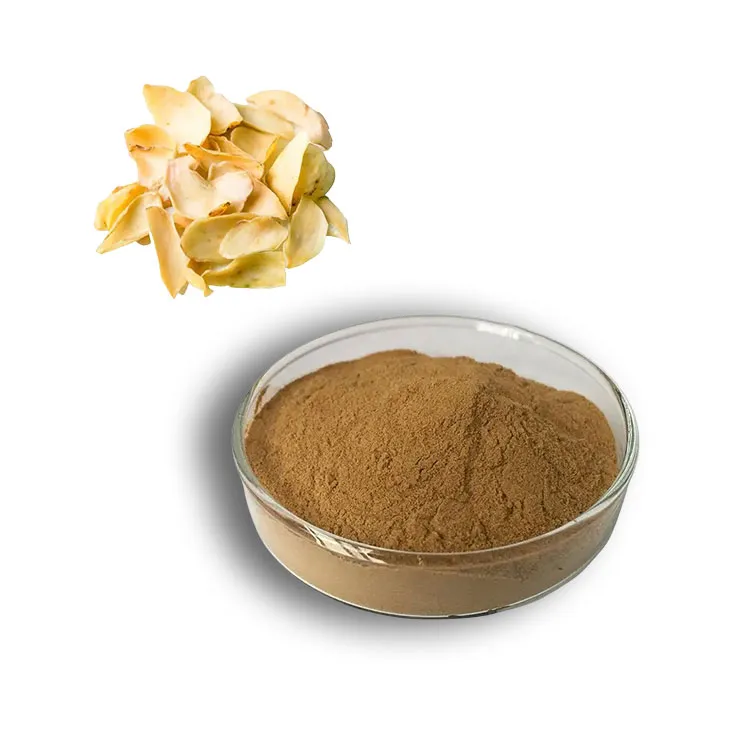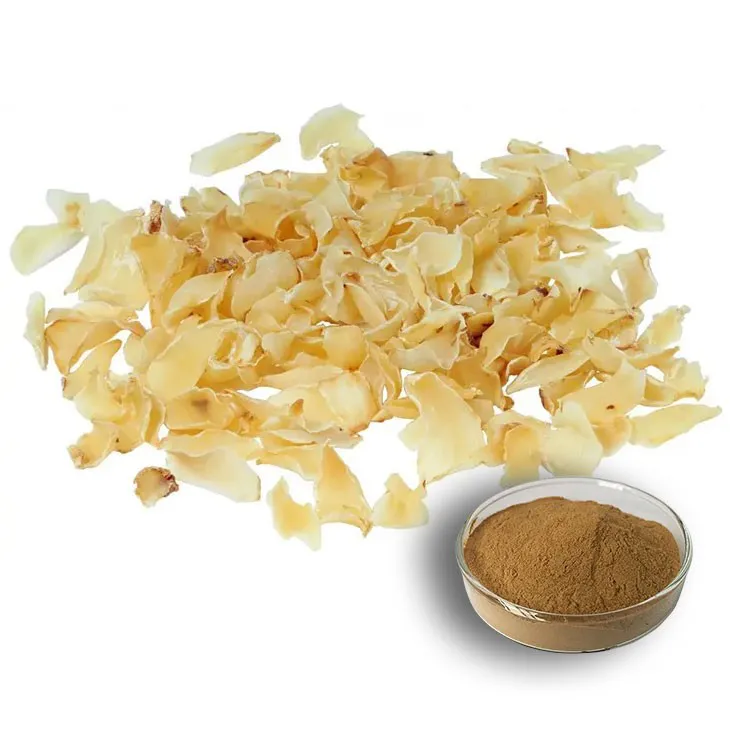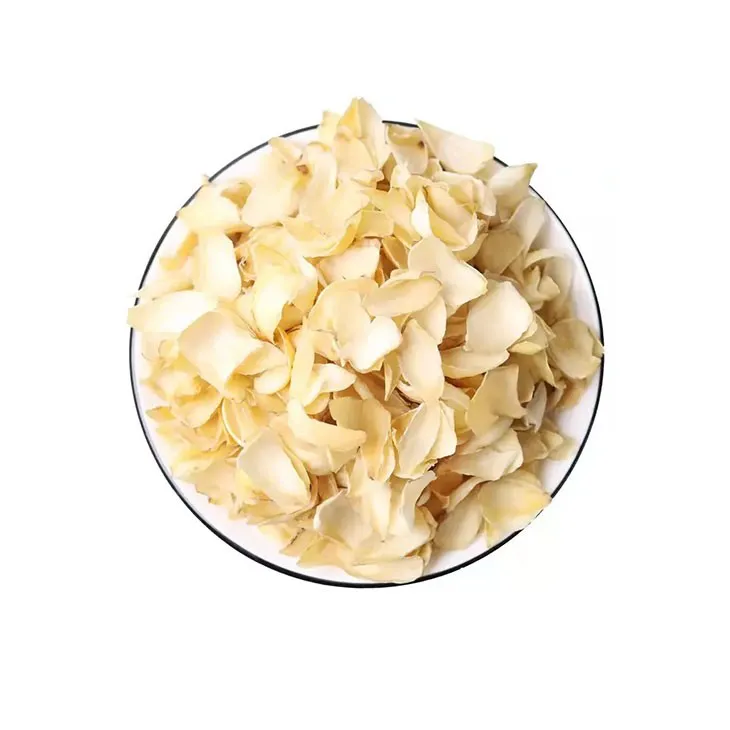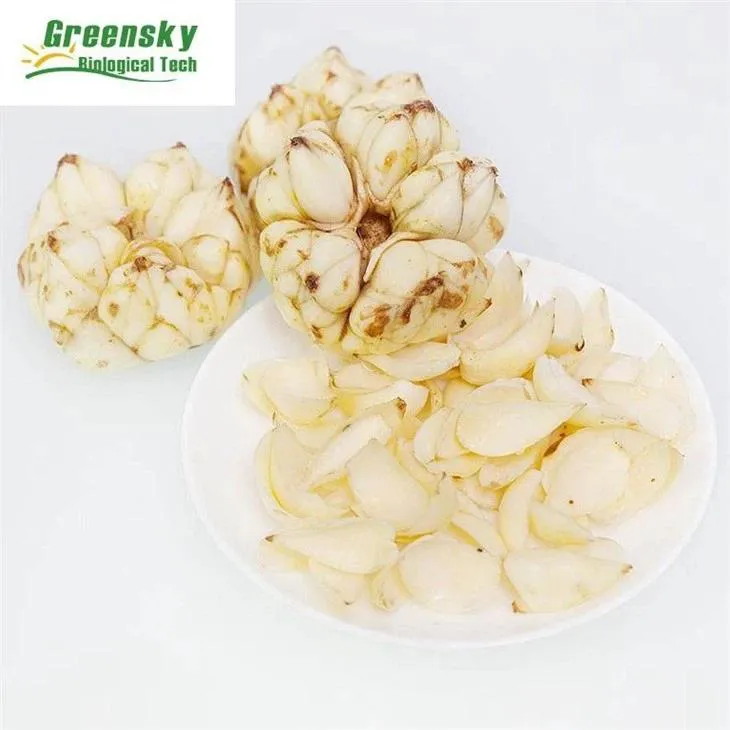- 0086-571-85302990
- sales@greenskybio.com
Use lily extract to prevent diseases and enhance immunity.
2024-11-12

Introduction
In the pursuit of natural ways to maintain health and prevent diseases, Lily extract has emerged as a promising candidate. The lily, a plant known for its beauty and elegance, also harbors a wealth of nutrients and bioactive compounds that can play a significant role in safeguarding our well - being and enhancing the body's immune function.

The Nutritional Composition of Lily extract
Lily extract is rich in a variety of nutrients that contribute to its health - promoting properties.
1. Vitamins
- Vitamin C: It is a powerful antioxidant that helps protect cells from damage caused by free radicals. Vitamin C also plays a crucial role in the immune system, as it is involved in the production of white blood cells, which are essential for fighting off infections. A deficiency in vitamin C can lead to a weakened immune system and increased susceptibility to diseases.
- Vitamin B Complex: This includes vitamins such as thiamine (B1), riboflavin (B2), and niacin (B3). These vitamins are involved in various metabolic processes in the body, including energy production. A well - functioning metabolism is necessary for a healthy immune system, as it provides the energy and resources needed for immune cells to function properly.
2. Minerals
- Potassium: It is an important mineral for maintaining proper heart function and regulating blood pressure. A balanced potassium level in the body also helps in nerve function, which is indirectly related to the immune system. Nerves play a role in transmitting signals that can affect the body's response to infections.
- Magnesium: This mineral is involved in over 300 enzymatic reactions in the body. It is essential for DNA synthesis, protein production, and muscle function. A sufficient supply of magnesium is necessary for the proper functioning of immune cells, as these processes are all related to the immune response.

Bioactive Compounds in Lily Extract
Lily extract contains several bioactive compounds that have unique physiological effects.
1. Alkaloids
- Some alkaloids in lily extract have been shown to have antimicrobial properties. They can inhibit the growth of bacteria, viruses, and fungi. For example, certain alkaloids may interfere with the replication process of viruses, preventing them from multiplying and causing infection.
- Alkaloids may also have anti - inflammatory effects. Inflammation is a natural response of the body to injury or infection, but chronic inflammation can be harmful and is associated with many diseases. By reducing inflammation, these alkaloids can help prevent the development of chronic diseases and support the immune system.
2. Flavonoids
- Flavonoids are well - known for their antioxidant properties. They scavenge free radicals in the body, reducing oxidative stress. This is important for the immune system because oxidative stress can damage immune cells and impair their function. By reducing oxidative stress, flavonoids can help keep the immune system functioning optimally.
- Some flavonoids in lily extract may also enhance the activity of immune cells. They can stimulate the production and activation of white blood cells, such as lymphocytes and macrophages, which are key players in the immune response against pathogens.

How Lily Extract Prevents Diseases
1. Protecting Against Infections
The antimicrobial properties of lily extract, due to its alkaloids and other compounds, can help protect the body against a variety of infections.
- Bacterial Infections: Lily extract can inhibit the growth of common pathogenic bacteria such as Escherichia coli and Staphylococcus aureus. By preventing these bacteria from multiplying, it reduces the risk of developing infections such as urinary tract infections and skin infections.
- Viral Infections: As mentioned earlier, some components in lily extract can interfere with viral replication. This can be beneficial in preventing viral diseases such as the common cold and influenza. During the flu season, for example, incorporating lily extract into the diet may provide an additional layer of protection against the virus.
- Fungal Infections: Fungi can cause infections, especially in areas of the body with high moisture, such as the feet and groin. Lily extract's antifungal properties can help prevent the growth of fungi like Candida albicans, reducing the likelihood of fungal infections.
2. Preventing Chronic Diseases
- Cardiovascular Diseases: The potassium and magnesium in lily extract can help regulate blood pressure, reducing the risk of hypertension, a major risk factor for cardiovascular diseases. Additionally, the anti - inflammatory and antioxidant properties of lily extract can prevent the oxidation of LDL cholesterol (the "bad" cholesterol) and reduce inflammation in the blood vessels, further protecting against heart diseases and strokes.
- Cancer: While lily extract is not a cure for cancer, its antioxidant and anti - inflammatory properties may play a role in cancer prevention. Oxidative stress and chronic inflammation are two factors associated with the development of cancer. By reducing these factors, lily extract may help prevent the initiation and progression of cancer cells. Some studies have also suggested that certain compounds in lily extract may have direct anti - cancer effects, such as inducing apoptosis (programmed cell death) in cancer cells, but more research is needed in this area.
- Diabetes: Lily extract may help in the prevention of diabetes. The bioactive compounds in it can improve insulin sensitivity, which is crucial for maintaining normal blood sugar levels. By enhancing insulin function, lily extract can reduce the risk of developing type 2 diabetes, which is often associated with insulin resistance.

Enhancing Immune Function with Lily Extract
1. Stimulating Immune Cell Production
The nutrients and bioactive compounds in lily extract can stimulate the production of immune cells in the body.
- For example, the vitamin B complex is involved in cell division and growth, which is necessary for the production of white blood cells. A sufficient intake of lily extract, rich in vitamin B complex, can ensure an adequate supply of these nutrients for the bone marrow, where white blood cells are produced.
- Flavonoids in lily extract can also enhance the production of lymphocytes, a type of white blood cell that plays a key role in the adaptive immune response. By increasing the number of lymphocytes, the body is better equipped to recognize and respond to specific pathogens.
2. Boosting Immune Cell Activity
- Alkaloids in lily extract may enhance the phagocytic activity of macrophages, which are immune cells that engulf and destroy pathogens. This means that macrophages can more effectively clear bacteria, viruses, and other foreign particles from the body, strengthening the immune defense.
- The antioxidant properties of lily extract help maintain the integrity of immune cells. By reducing oxidative damage, immune cells can function more efficiently. For example, neutrophils, another type of white blood cell, can better perform their functions of releasing antimicrobial substances and destroying pathogens when protected from oxidative stress.
Ways to Incorporate Lily Extract into Your Diet
1. Lily - Based Beverages
- One simple way is to make lily tea. Boil dried lily bulbs or lily petals in water for a few minutes, then let it steep for a while. You can add honey or lemon for flavor. Lily tea can be a refreshing and healthy drink that provides the benefits of lily extract.
- Another option is to make a lily - infused smoothie. Blend fresh or dried lily extract with fruits like bananas, strawberries, and a liquid such as almond milk or yogurt. This creates a delicious and nutritious smoothie that can be consumed as a part of your daily diet.
2. Lily - Containing Meals
- Lily bulbs can be cooked and added to soups, stir - fries, or casseroles. For example, in a vegetable soup, adding lily bulbs can not only enhance the flavor but also provide the health benefits of lily extract. In a stir - fry, lily bulbs can be combined with other vegetables and proteins like chicken or tofu.
- Some traditional cuisines already incorporate lily in their recipes. For instance, in Chinese cuisine, lily bulbs are often used in sweet or savory dishes. By exploring these traditional recipes or creating new ones, you can easily include lily extract in your diet.
Precautions and Considerations
1. Allergies
Some people may be allergic to lilies. Before incorporating lily extract into your diet, it is important to test for allergies. If you have a history of allergies to plants in the lily family or experience symptoms such as itching, swelling, or difficulty breathing after exposure to lilies, it is best to avoid lily - based products.
2. Dosage
While lily extract has many potential health benefits, it is important to consume it in moderation. Excessive intake may lead to adverse effects. There is currently no standardized recommended dosage for lily extract. However, it is advisable to follow general dietary guidelines and consult a healthcare professional if you plan to use lily extract for therapeutic purposes.
Conclusion
Lily extract offers a natural and potentially effective way to prevent diseases and enhance immunity. Its rich nutritional composition and bioactive compounds provide multiple mechanisms through which it can protect against infections, prevent chronic diseases, and boost the immune system. By incorporating lily extract into our diets in appropriate ways and with proper precautions, we can take advantage of its health - promoting properties. However, more research is still needed to fully understand its effects and to establish optimal usage guidelines.
FAQ:
What are the main nutrients in lily extract?
Lily extract contains various nutrients. It is rich in polysaccharides, which are important for various physiological functions in the body. It also contains amino acids, which are the building blocks of proteins and play crucial roles in maintaining the normal operation of the body. Additionally, it may have some minerals and vitamins, although the specific composition can vary depending on the type of lily and the extraction method.
How does lily extract enhance immunity?
The bioactive compounds in lily extract play a significant role in enhancing immunity. For example, the polysaccharides in it can stimulate the immune cells, such as macrophages and lymphocytes. These cells are important components of the immune system. Macrophages can engulf and destroy foreign invaders, while lymphocytes are involved in specific immune responses. By activating these cells, lily extract helps the body to better defend against diseases.
Can lily extract prevent all types of diseases?
No, lily extract cannot prevent all types of diseases. While it has certain beneficial effects on the body's immune system and may help prevent some diseases related to immune function deficiency. However, there are many diseases caused by factors such as genetic mutations, environmental toxins, and specific pathogens that cannot be solely prevented by lily extract. For example, genetic diseases are mainly determined by the genetic makeup of an individual and are not directly preventable by lily extract.
Are there any side effects of using lily extract?
In general, when used in moderation, lily extract is considered relatively safe for most people. However, some individuals may be allergic to lily or its components. In such cases, using lily extract may cause allergic reactions such as skin rashes, itching, or swelling. Also, if lily extract is consumed in excessive amounts, it may potentially cause some digestive discomfort, such as nausea or diarrhea.
How should lily extract be used for the best preventive effect?
The best way to use lily extract for preventive purposes can vary. It can be consumed in the form of dietary supplements, following the recommended dosage on the product label. Some people also use lily extract in cooking, for example, adding it to soups or stews. However, it is important to ensure that the lily extract is obtained from a reliable source. And it should be used in combination with a healthy lifestyle, including a balanced diet, regular exercise, and sufficient sleep, to achieve the best preventive effect.
Related literature
- The Nutritional and Bioactive Components of Lily and Their Health - Promoting Effects"
- "Lily Extract: A Promising Natural Immune Booster"
- "Bioactive Compounds in Lily and Their Role in Disease Prevention"
- ▶ Hesperidin
- ▶ citrus bioflavonoids
- ▶ plant extract
- ▶ lycopene
- ▶ Diosmin
- ▶ Grape seed extract
- ▶ Sea buckthorn Juice Powder
- ▶ Beetroot powder
- ▶ Hops Extract
- ▶ Artichoke Extract
- ▶ Reishi mushroom extract
- ▶ Astaxanthin
- ▶ Green Tea Extract
- ▶ Curcumin Extract
- ▶ Horse Chestnut Extract
- ▶ Other Problems
- ▶ Boswellia Serrata Extract
- ▶ Resveratrol Extract
- ▶ Marigold Extract
- ▶ Grape Leaf Extract
- ▶ blog3
-
High purity olive leaf extract
2024-11-12
-
Lavender oil extraction method
2024-11-12
-
100% organic virgin sea buckthorn fruit oil
2024-11-12
-
Lotus leaf extract powder factory in China
2024-11-12
-
China aged garlic extract supplier
2024-11-12
-
Deer antler extract powder manufacturer
2024-11-12
-
Saw palmetto extract vs whole herb
2024-11-12
-
Selenium yeast
2024-11-12
-
Ginger Extract
2024-11-12
-
Ivy Extract
2024-11-12
-
Grape Leaf Extract
2024-11-12
-
Cassia Seed Extract
2024-11-12
-
Acai Berry Extract
2024-11-12
-
Black Garlic Extract
2024-11-12
-
Epimedium extract powder
2024-11-12
-
Diosmin
2024-11-12
-
Cranberry Extract
2024-11-12





















